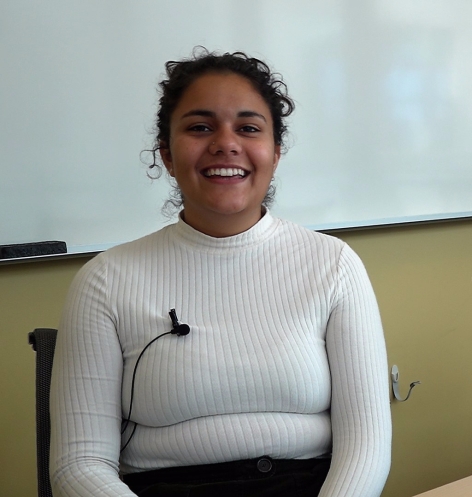
By: Nicole Schaller
October 9, 2017
WASHINGTON—Liliana Ascencio walked into an executive board meeting for Students Against Sexual Violence (SASV) in her sophomore year out of curiosity. Three years later, Ascencio is now on the SASV executive board as co-director, and is part of the reason American University was honored an award for leadership in sexual-assault prevention education.
“We’ve [SASV] played a lot of roles,” said Ascencio. “Not just from the time I’ve been here, but since the time we’ve been alive as an organization. We started out much more as a grassroots organization focused on mobilizing crowds, protests and direction action, and I think over time we’ve also incorporated education into our platform.”
Part of their efforts in education prevention was helping to implement Empower AU. First introduced in 2015, Empower AU is a mandatory consent education program that is taught at freshman orientation.
Empower AU was also a main reason American University won the Prevention Excellence Award from the nation’s leading education technology innovators, EVERFI Inc. AU is one out of five universities to receive the honor.
“We [SASV] were one of the biggest pushers, biggest strivers for Empower AU to be instituted,” said Ascencio. “A former member of SASV, Faith Ferber, was very vocal and instrumental in the implementation of Empower AU. It is an amazing change in sort of how we conceive, how we think about sexual-violence prevention.”
Ascencio further explained how the program sets a precedent for freshman to be held accountable for knowing what is consent, and the importance of it in dealing with sexual-violence prevention.
“[Empower AU is] a huge tool,” said Ascencio. “Because, in our conduct process [for reporting sexual-violence], perpetrators or respondents are responsible for knowing the material and understanding what consent is.”
Over the semester, SASV also holds educational events open to all students that focus on different sexual-violence topics. Some topics they have covered include how to help a friend if they disclose a sexual-assault instance, and the steps involved in reporting a Title IX case. This semester, SASV had an event focused on sexual-violence policies. They discussed the possible changes the Trump Administration may take, based on Betsy Devos’ comments that Title IX does not fairly protect the accused perpetrator.
Beyond being a part of sexual assault prevention education, SASV also works with sexual-violence survivors.
“What we aim to do is push the university,” said Ascencio. “And to push our students to gain knowledge about sexual-violence prevention, and also to create substantial change for survivors on our campus.”
One way which SASV helps survivors is by being an intermediary between them, and the resources that are available to them on campus.
“A lot of students know about OASIS, a lot of students know about Title IX, but they may not feel comfortable going to them directly,” said Ascencio. “So, having somebody who’s your peer to talk to, and to sit down and think about these issues with, is also one of the most important roles we play.”
SASV also provides self-care spaces for survivors, as well as friends and family members of survivors. These spaces are focused on promoting support and guidance to survivors and creating a community. Throughout the year SASV will host several self-care events for survivors to come together and watch movies, color in coloring books, or just drink tea and socialize.
Despite all the positive changes, Ascencio did note there are still serious challenges still on campus.
“We still have an issue with believing survivors,” said Ascencio. “We still have an issue with listening to survivors and students are not necessarily prepared or trained to deal with that.”
She did also note that this is not just a challenge faced on American University’s campus, but on a larger scale based on issues that face society.
“Sexism and sexual-violence are all results of products of systems that we live in,” said Ascencio. “There all cultural and embedded deeply in our culture and society. So, it’s not necessarily AU specific, but we all come from that cultural framework, regardless of our upbringing.”
Ascencio, originally form San Francisco, is currently a senior and majoring in public health with a minor in sociology. She became interested in sexual-assault prevention due to personal connections.
“It’s something I’ve always been passionate about in my own life,” said Ascencio. “I’ve had family and friends also experience sexual-violence. So, seeing their experience also motivated me to try to make a change in our culture, in our society, and working with in AU’s campus is a start to making that change. It makes me feel connected to my community and I like doing something positive.”